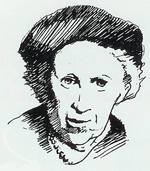Meet Olive Hyde
Miss Olive Hyde: A Legacy of Art & Community
At the request of the Tri-Cities Women’s Club, Lisa Stambaugh researched and created a presentation about the life of Miss Olive Hyde. Miss Olive was a Fremont resident and philanthropist with a deep appreciation for arts and education. This presentation covers in detail her 30-year stay in Fremont, and her deep influence in the Mission San Jose area and beyond.
Olive Hyde, In Memoriam
Excerpted from “In Memoriam” written by Cecilia Weed, President WTHS and longtime friend of Olive Hyde

Olive Hyde was born in San Francisco, California on June 19, 1886, the daughter of Frederick and Filena Hyde. She grew up in San Francisco, studying under private tutors and musicians. She was the youngest of four children, Alice, Florence, Allan and Olive. Her father was an expert in real estate law.
Olive was a strong personality, yet possessed great humility. Her very dignified and gracious manner reflected her Bostonian ancestry. Although she grew up in a well-to-do family, she lived a very simple — almost frugal — life. The furnishings in her home in Mission San Jose were bamboo with touches of oriental art throughout. She had no television but a stereo with volumes of symphonies and classical music. She acquired many beautiful works of art — Thomas Hill paintings, oriental screens, beautiful porcelains — only to channel them, at very nominal fees, through her small antique and gift shop (The Mission Shop) into the homes of striving young families who appreciated fine art but could not afford the market price.
An avid historian and conservationist, Miss Hyde decided to buy property near the Mission. She purchased the former Sigrist Hotel south of the Mission, removed it and built a small cottage and music studio.
Miss Hyde was a true patriot. During World War I, she went to Camp Fremont, near Menlo Park, and volunteered her services to the Red Cross. She made thousands of sandwiches and distributed them to the troops. She wrote her mother in San Francisco and told of the long hours and how she would stretch out on the wood floor to get some rest between troop trains.
During World War II, with the shortage of labor, she worked in the fruit, cutting ‘cots and peaches in the Mission San Jose and Warm Springs areas. A devout member of the Centerville Presbyterian Church, she would not use the rationed gas to drive those six miles to attend Sunday service. Instead, she attended the closest church — Old St. Joseph’s Catholic Church (1869) in Mission San Jose. She and Father Leal, Pastor of St. Joseph parish, became good friends; both fine musicians, both highly intellectual. During the depression years, Miss Hyde gave $100 per month for the upkeep of the Mission.
In the 1940s, Miss Hyde purchased the Boulder Saloon on the corner of Mission and Washington Boulevards (site of the J.J. Vallejo home). She removed the saloon and hired a noted architect, Butler Sturdyvant, to design two buildings, now known as the Mission Room and Art Gallery.
In 1958, she purchased the old livery stable on Mission Boulevard across form the Mission, and refurbished it into a small gift shop and living quarters for her brother Allan, and herself.
In December 1962, she gave to the City of Fremont the two buildings on the corner, and in addition a large lot on Mission Boulevard just 50 yards to the north to be used for parking and open space. Her generosity continued to prevail and in December 1964, Fremont was the recipient of her gift of the refurbished livery stable and a $10,000 cash stipend to maintain it.
Miss Hyde gave all of these properties to the City, asking only that the buildings be used for educational and cultural purposes, and the lot for parking as an “open space” in Mission San Jose.
She worked for the incorporation of the five communities — Mission San Jose, Warm Springs, Irvington, Centerville, Niles — into the City of Fremont, serving on the first Citizens Committee. She gave the funding for a wildlife study of Stivers Lagoon (now Lake Elizabeth). She organized the Mission San Jose Women’s Association which was instrumental in saving the hill lands for Ohlone College.
This very intelligent and gracious lady came to Mission San Jose to protect and enhance the Mission. A new city grew — she mothered it. She gave of herself. She gave of her talents. She gave of her worldly wealth. She asked nothing in return. Now it is time for Fremont to say “thank you” and inform the residents, especially the children, of the legacy left to them by this great life.
Her life is an inspiration — her memory is a benediction.
